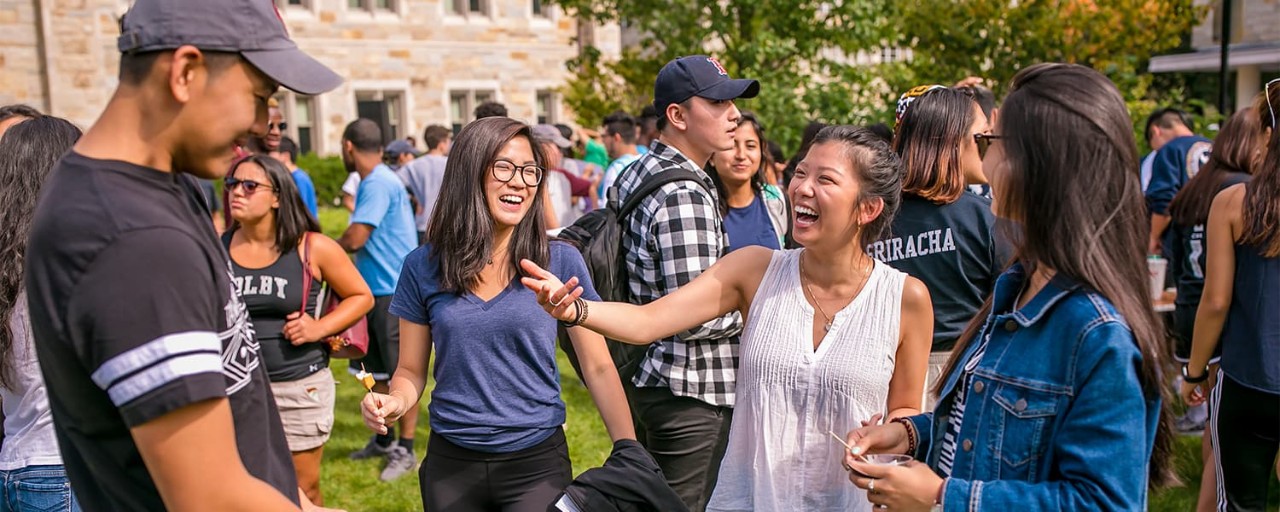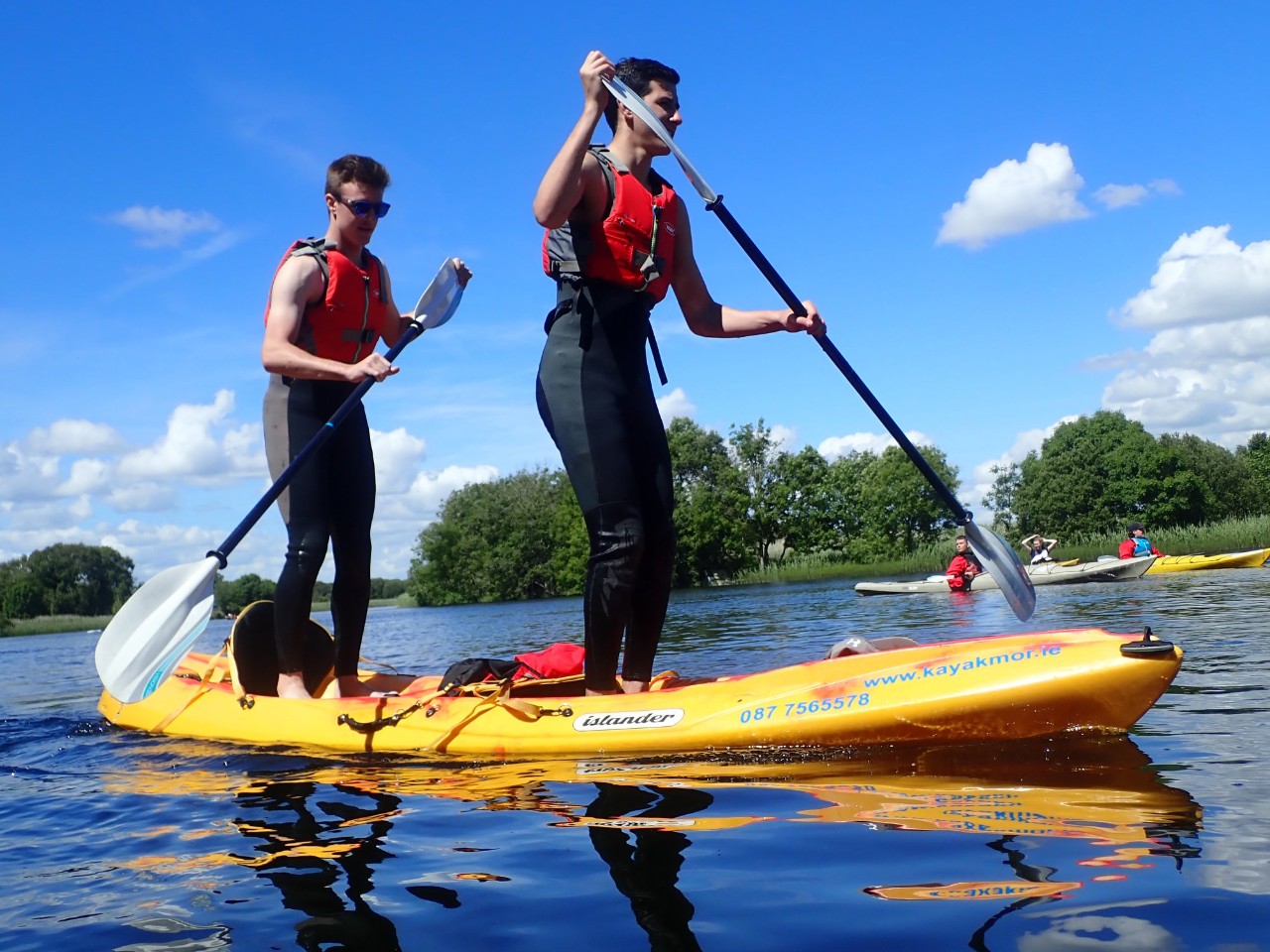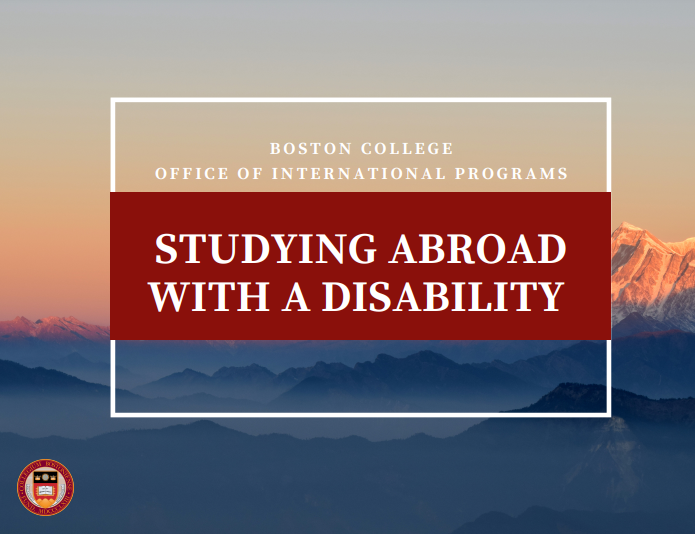Identity Abroad
The OGE hopes to prepare students to wrestle with how their own identities may interact and change within an unfamiliar cultural context, enriching and complicating their study abroad experience. Given the relevance of a global education in preparing students for an increasingly competitive and globalized world, it is imperative that every BC student has the option to go abroad - regardless of race/ethnicity, gender, finances, on-campus commitment or area of study. The OGE strongly believes in affording transformative study abroad experiences to all eligible BC students, and not just a select few. Our commitment is rooted in the belief that all students' experiences overseas are enhanced through a diversity of perspectives and backgrounds.
See below for resources at BC, in addition to what is found in the OGE semester and summer handbooks. OGE advisors can direct students to location-specific services and materials. Please do not hesitate to reach out to the OGE with any questions or concerns.
Access to facilities and resources for people with disabilities may not be the same abroad as it is in the U.S. We encourage students with documented disabilities to consider the types of accommodations they will need when exploring the possibilities for going abroad. Many BC programs are accessible to most students with disabilities, and we will work to ensure reasonable accommodations.
Although many countries are becoming more aware of the needs of people with disabilities, not all countries have similar laws and accessible infrastructure and services. Consequently, requests which may be reasonable in a domestic context may not be reasonable in the international context in light of available resources. When contemplating study abroad, students should:
- Research possible accommodations in other countries such as accessible housing, public transportation, assistive technology, admission of service animals, etc.
- Research alternative study abroad options in countries where appropriate accommodations may be more readily available.
Please note that all requests for services and accommodations must be supported by the documentation on file and be reasonable and appropriate within the limits set forth by state and federal law and University procedure. The University will make efforts to assist students with finding reasonable accommodations to participate in the program. The accommodations cannot fundamentally alter the nature of a course or program of study or present an undue hardship for either Boston College or the host institution. Students participating in non-BC programs should notify and seek assistance from the approved external program provider.
FAQs and special considerations:
Q:Will my disability affect which program type I want to go on?
A: Disclosure will not affect students' chances of being accepted into a study abroad program. Not all program sites abroad are equipped to accommodate students with disabilities in the same way. OGE advisors can provide further information about a specific program site, as well as additional resources.
Q: Will I disclose my disability to my OGE advisor?
A: Students are strongly encouraged to speak with an OGE advisor about program(s) they are considering and disclose their disability early on in the process.
Q: How might my accommodations differ from those I receive at Boston College?
A: A number of programs/BC partner universities abroad require advance notice and a formal request for accommodations submitted by the OGE. With careful planning, most students are able to receive similar accommodations to those available at BC.
On-campus Resources
Off-campus Resources
- Access Abroad
- Diversity Abroad
- Go Overseas: How Students with Disabilities Study Abroad
- Mobility International USA: Students with Disabilities Abroad
- Studying in Australia
- Studying in Germany
- Studying in the UK
- U.S. Department of State: Travelers with Disabilities
- How to Make Flying With Physical Disabilities Less Stressful: A Fully Accessible Guide

Commonly held cultural attitudes regarding gender roles vary across cultures and may not always align with your own values or experience. In certain locations, women in particular may feel significantly different about what their gender identity means abroad than at home. This may affect decisions about behavior, relationships, dress, safety, travel plans, and daily routines. When making decisions about behavior, actions, and relationships abroad, all students are urged to put their safety first. You are also encouraged to inform yourself throughout the study abroad process of local cultural cues and gender roles in order to help make the best decisions for you.
It is just as important for men to understand the prevailing gender roles in their program location, and to be sensitive to the challenges that women in the program may face that men may not. Your identity as a male may be different in another cultural context, and you are advised to research what that might entail.
Questions to consider:
What are the gender norms and perceptions of my host country and how do they align/differ from those of my own community or my own personal values?
How do people express their gender in my host country through clothing, behavior, and language? How can I adjust to potential differences to be culturally respectful and appropriate?
On-campus Resources
Off-campus Resources
- Diversity Abroad
- Journeywoman
- Transitions Abroad
- U.S. Department of State
(Information for Women Travelers)

Acceptance towards lesbian, gay, bisexual, transgender, and queer (LGBTQ) students varies by location and depends upon each country or area’s cultural norms and laws. In some countries, LGBTQ individuals are afforded equal rights and are protected by law from discrimination. There are other countries where openly identifying as LGBTQ is punishable by law, or there may be no laws to protect an individual from hate crimes. While most LGBTQ students will not have any problems, it is important to know the legal regulations and conditions of your location before you go to stay safe and make the most of your experience.
Questions to consider:
What are the cultural attitudes and local laws towards LGBTQ individuals and how may they affect my decision to study abroad in a specific location?
Are there any safety questions to take into consideration when being open about my identity in my host community?
On-Campus Resources
Legal Resources
International Organizations
- International Lesbian, Gay, Bisexual, Trans and Intersex Association
- OutRight Action International
- Amnesty International: Gender, Sexuality & Identity

A common misconception about studying abroad is that it is an opportunity reserved only for students who are not on financial aid. In fact, on BC programs your BC financial and federal aid follows you to your semester or academic year abroad. Studying abroad is not necessarily more expensive than a semester at Boston College. While some programs in large metropolitan areas may cost more than a semester in Chestnut Hill, expenditures for many other programs may be the same or less than at BC. We encourage Monsterrat students and any student, who believes that cost might be prohibitive to them studying abroad, to make an appointment with their OGE advisor as well as the Montserrat and scholarships advisor at OGE. The key to being cost-conscious while studying abroad is planning ahead and creating a budget that is right for you.
Questions to consider:
What program type and location fit better with my current financial status?
How will I budget for studying abroad? What expenses do I expect to incur?
Race and ethnicity is defined and talked about differently in other countries, and students may come across situations that differ from those experienced in the U.S. For some students, studying abroad may afford them the experience of being in the racial majority for the first time. For others, you may experience the opposite. Those with whom you come into contact may make certain assumptions based on your physical appearance or what they have seen from popular culture, as is the case in all countries. Some may be interested to learn more about you, but there may be others whose behavior toward you might make you uncomfortable. In many other countries, people talk about racial and ethnic differences more bluntly or directly. Generally, people will mean well. If at any point you feel unsafe, you should remove yourself immediately from the situation and get help, as needed.
Studying abroad provides an opportunity to engage in dialogues in a new and different manner; as a result, it is recommended that all students research how questions of race and ethnicity are addressed and talked about in their host country.
Questions to consider:
How will my own racial or ethnic identity impact my experience studying abroad?
How does my host country define and talk about race and ethnicity? If different from the U.S.’, will I be able to adjust to the different cultural context?
How will I feel if I am in the minority in my host country or in my cohort of American students? How will I feel if I am in the majority?
Off-campus Resources
- All Abroad
- Diversity Abroad
- CIA World Factbook (“People and Society” section for each country for a breakdown by ethnic group, religion, and race.
- ES Abroad Country-Specific Resources
- Transitions Abroad ("Top 10 Reasons for African Americans to Study Abroad")
- Unpacked: A Study Abroad Guide for Students Like Me

Navigating the terrain of faith, spirituality, and practice can be difficult in a new environment. It can also be challenging to understand how your own religious identity fits into your host culture. In some cases, you might find that you are a minority for the first time based on your religion, which can make you more aware of your beliefs. In addition to the resources below, OGE advisors can provide support for students looking for places of worship overseas, as well as answer questions about faith and religion in your host country.
Questions to consider:
What are the major religions practiced in my host country and how do they affect its society?
Will I have access to my religion’s places of worship? Will my religion’s dietary restrictions be accommodated in my host country?

On-Campus Resources
- Diversity Abroad
- The Pluralism Project
- U.S. Department of State ("Religious Freedom Information Report")
Between training, competing, and school work, studying abroad seems like a distant dream for many athletes. However, student-athletes can and do go abroad. A few points to consider in selecting a program:
Timing: While it is not realistic to go abroad at the height of your sport's season, there may be a time when you can get away. If you have a break between seasons, in the fall or spring, look into this as an option when defining your availability. Summer can also be a possibility.
Workouts: Will you be able to take a break from an intense workout regime during your time abroad or do you need to keep up daily in your fitness efforts? If you require a minimum level of fitness upkeep, you should be able to travel anywhere and work runs, hikes, and in-room workouts into your routine as needed.
Equipment: If your sport requires you to be more diligent in your training or requires specialized equipment, we recommend that you speak to your coach about alternative fitness options while you are away. We can also identify programs that have the facilities you need.
Join a team abroad: If you are attending a university abroad, look for university teams or club sports to continue playing. This will also be a great way to integrate into the local culture.

On-campus Resources
- Go Abroad ("Common Myths About Studying Abroad as a Student Athlete")
- 60 on Study Abroad: Student Athletes
Jesuit education is rooted in a world view that respects all cultures and faith traditions. Boston College strives to ensure that all students, faculty, and staff feel they are valued members of our University community.



